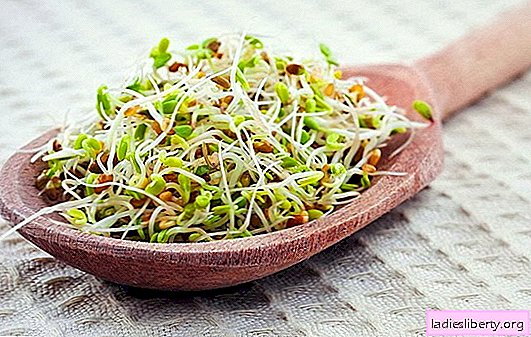
It is sometimes difficult for pregnant women to deal with changing eating habits and no less difficult with established habits.
What, for example, is a woman doing every morning starting her day with a cup of aromatic coffee if she finds out that she is now carrying her baby under her heart?
How to proceed?
Is it possible for a pregnant woman to drink coffee or will this adversely affect her health and the health of the baby?
Can pregnant women drink coffee? The opinion of doctors, tips, restrictions
Questions of nutrition and a pregnant woman’s lifestyle often cause controversy among the relatives of the future mother and in various forums.
Coffee is considered far from a healthy drink. From coffee vessels are narrowed, blood pressure rises and heart rate increases. Here lies the main pitfall, since pregnant women often have low blood pressure, and how can I refuse a cup of your favorite drink, which in this case seems to be only beneficial?
The largest studies on this subject were conducted at the American College of Obstetricians and Gynecologists. In 2010, an unambiguous decision was made that a small amount of caffeine cannot seriously affect the course and outcome of pregnancy and does not worsen the health status of the expectant mother and her baby. According to studies, the maximum daily dose of caffeine should not exceed 200 mg per day for an absolutely healthy woman who was not bothered before with heart problems, blood vessels, not suffering from edema or high blood pressure. It should be understood that the strength and types of drinks containing caffeine are very diverse, so consider the main ones.
If you translate 200 mg of caffeine into a ml of a drink, it turns out that you can drink a pregnant woman without exceeding the following volume:
• 94 ml of espresso;
• 750 ml of instant coffee;
• 1 liter of black tea.
Regular excess of the maximum allowable amount of caffeine entering the pregnant woman’s female body leads to an almost double increase in cases of abortion, in other cases, newborns suffer from weight loss and hypoxia. Coffee can cause a miscarriage at any time, but in the first trimester, this figure still increases to 2.4 times compared with the number of miscarriages among women who did not have caffeine in their diet.
Based on these studies, doctors do not recommend drinking coffee during pregnancy, or at least making sure that the daily dose of caffeine is not exceeded.
What kind of coffee can pregnant women drink? Safe Coffee Recipes
During pregnancy, the woman’s natural desire is to lead the most correct and healthy lifestyle. But hormonal bursts, a sharp change in mood and taste habits sometimes interfere with the expectant mother to protect herself from the desire to sometimes have a cup of coffee. In this case, it is important to protect yourself and the baby as much as possible from the harmful effects of the drink, so pregnant women can only drink coffee with milk to reduce the concentration of the drink.
The basis of drinks with milk is the classic Espresso, for which 14 grams of ground coffee beans are brewed in 50 ml of water. The output is 30 ml of a strong drink. By adding plain or frothed milk and cream in different proportions you can get Cappuccino, Latte or Brive. The amount of milk in these drinks is added approximately in a ratio of 2: 1.
This list does not include Macchiato so common among coffee lovers. The fact is that the concentration of caffeine in it is much higher, because no more than half a teaspoon is added to the Makiato cup of milk.
In coffee houses, they often offer "Cappuccino" with various additives - cherries, chocolate, etc. Doctors strongly recommend not to order such drinks to pregnant women, because they do not contain a piece of chocolate or a berry, but add concentrated syrup, in which there are absolutely no natural ingredients.
How can a pregnant woman get rid of the urge to drink coffee? How can it be replaced?
Medical studies still leave some women doubtful whether she can drink coffee while pregnant, or is it better to completely abandon this drink. In any case, you can try to deceive the body and replace coffee with other more wholesome foods and drinks.
Before looking for a replacement product, you need to decide, and what actually prompts you to drink coffee, what kind of sensations does a woman experience?
• Desire to taste or smell coffee. Cocoa or cinnamon tastes no worse, and some even like it better.
• Lack of energy, drowsiness. The invigorating properties attributed to coffee actually take place, however, they are greatly exaggerated compared to other drinks:
- A glass of clean cool water will allow you to wake up and enjoy the beginning of the day. In this case, water even has an advantage, it is more accessible and does not require preparation time, like coffee, which must first be brewed.
- tea with lemon. Lemon has a tonic effect on the body, and tea contains caffeine, which is slightly different in composition from coffee, therefore it acts on the body more gently.
- fruits, berries. As a rule, the body cannot sleep during chewing, so a few pieces of fruit or berries, especially sour ones, relieve drowsiness and at the same time enrich the body with vitamins.
The desire to drink just coffee can indicate a lack of certain trace elements in the body. In this case, they can be obtained not only from drinks, but also from food.
• Phosphorus. A deficiency leads to nervous exhaustion, fatigue, irritability, weakness, sometimes giving way to too violent activity. Phosphorus can be obtained by adding fish, cottage cheese, peas, beans, black bread, cereals, cabbage, carrots, pumpkin, dairy products to the diet.
• Sulfur. Heart palpitations, joint pain, brittle, weak hair and nails, constipation are signs of a lack of sulfur. It is found in cabbage, cereals, onions, garlic, apples, eggs and cheese.
• Iron. Signs of anemia are dryness and sensitivity of the skin, pallor, weakness, dizziness, loss of attention. A lot of iron is found in the liver, beef, buckwheat, oatmeal, beans, rosehips, apples, berries.
Particular attention should be paid to the fact that in no case should you replace regular coffee with decaffeinated coffee. This product was subjected to multiple chemical treatments and even with almost complete absence of caffeine in the composition is capable of only harming the body.











